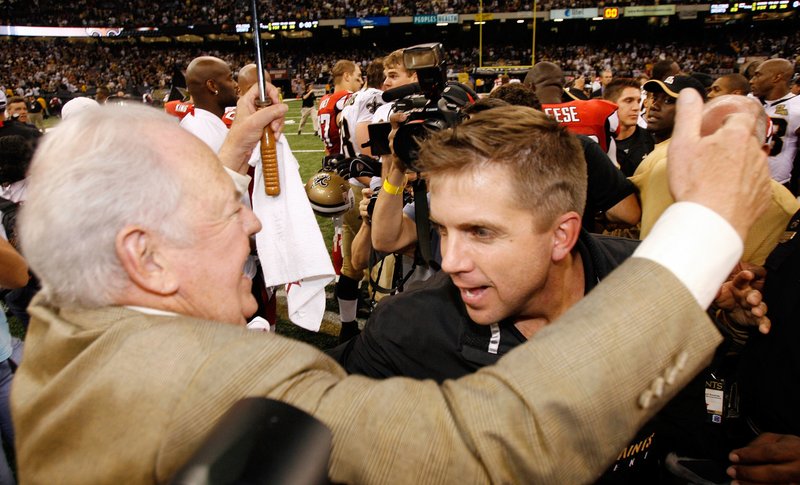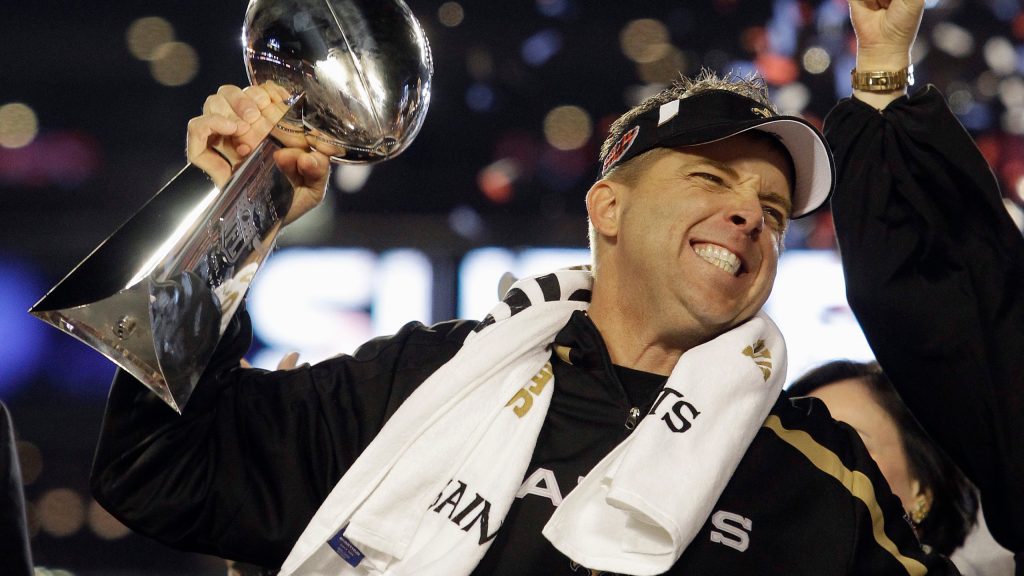
Sean Payton after the Saints’ dramatic 31-17 victory over the Colts in the Super Bowl in February, 2010.
LONGTIME SAINTS COACH LEAVES AN IMPRESSIVE LEGACY AND THE FUTURE LOOKS PRETTY BRIGHT, TOO
It was January 18, 2006, less than five months after the landfall of Hurricane Katrina.
Most of New Orleans was still in ruins. Getting from Point A to Point B was always riddled with complications. The New Orleans Saints, a moribund NFL franchise for the vast majority of their 38 years in the league, were set to introduce their 13th head coach.
I remember that afternoon at the Saints’ training facility in Metairie, Louisiana. Sitting in that conference room, curious as the next guy as to what would happen, next.
Looking back, it may have been the most important day in club history.
I’d been working as a sportswriter and columnist on the Mississippi Gulf Coast for 12 years. I saw the end of the Jim Mora era, when the Saints’ defense delivered in the regular season before the team fizzled in postseason play four different times. I was around for the Mike Ditka disaster, when Saints owner Tom Benson tried to bring in a celebrity coach with Mussolini-like people skills.
For awhile, I thought they might have had a chance with Jim Haslett, Ditka’s successor. Haz was a former NFL player, a linebacker with the Buffalo Bills, and he’d worked as the Saints’ defensive coordinator under Mora. In 2000, Haslett’s first season, the Saints won the first playoff game in club history, a dramatic victory over the St. Louis Rams, aka “The Greatest Show On Turf.”
One week later, the Saints traveled to Minnesota and got punked by Randy Moss and the Vikings.
Haslett was shown the door after the 2005 season, when Katrina forced the Saints to play home games at LSU’s Tiger Stadium, in Baton Rouge, and the Alamodome, a dreary, downtrodden stadium in San Antonio, just a few miles from Benson’s business offices.
There was plenty of talk, and posturing behind the scenes, about the possibility of the Saints relocating to San Antonio. And Benson did absolutely nothing to silence it. The Saints finished a dismal 3-13, which was Haslett’s epitaph. The team needed something different, something bold, something THAT ACTUALLY WORKED.
Enter Sean Payton.
The boyish-looking Payton was 43 years old, an import from the Dallas Cowboys, who worked in the college game before joining the Philadelphia Eagles’ staff as a quarterbacks coach in 1997. He went on to the New York Giants, and was demoted, mid-season, as the Giants’ offensive coordinator during their 2002 NFC championship season.
The wily Bill Parcells, the Cowboys’ coach at the time, brought Payton in as the team’s assistant head coach and quarterbacks coach. Sean Payton was anything but a household name, but Parcells told him he couldn’t pass up the opportunity, in spite of the Saints’ largely wretched history, not to mention the timing, the devastation of Hurricane Katrina.
Payton was young, he was bright, he was motivated, and he moved quickly.
A few months later, when the Louisiana Superdome was still under extensive repairs, Payton and the Saints held their training camp at Belhaven College in Jackson, Mississippi. The Saints had home exhibition games in Jackson and Shreveport, Louisiana. They wouldn’t play in the Superdome until three weeks into the regular season, in a “Monday Night Football” game against the hated Atlanta Falcons.
Payton, who stepped down as the Saints coach on Tuesday, apparently spent more time talking about the 2006 Saints team than any other, in his remarkable tenure, which included the only Super Bowl championship in club history, during the 2009-10 season.
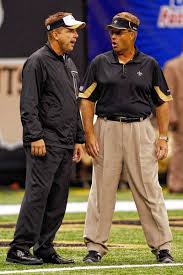
An uneasy alliance with controversial Gregg Williams, right, brought Sean Payton and the Saints the only Super Bowl championship in club history, but also resulted in “Bountygate,”
which resulted in a season-long suspension for the Saints coach in 2012.
Payton believed, and almost overnight, he made believers out of the Saints’ beleaguered fan base, too.
“When I started,” Payton said Tuesday afternoon, “I understood the dynamics and what took place post-Katrina, with that ’06 season that I thought and I would argue is every bit as important as any other season that we’ve had here relative to where the city was.
“And it became much more, much bigger than football.”
The Saints won that “Monday Night Football” game, against the Falcons, when Steve Gleason blocked that first-quarter punt and the Saints’ defense chased Michael Vick halfway to the airport in a 23-3 victory. They went 10-6, in regular-season play, winning the NFC South and playing host to the Philadelphia Eagles in the divisional round at the Superdome.
That wasn’t a particularly talented Saints team. But Payton had brought Drew Brees on board, via free agency, before drafting Heisman Trophy winner Reggie Bush and overhauling the roster. Payton and Saints GM Mickey Loomis stayed busy, on the personnel front. They knocked off the Eagles and traveled to Chicago for the NFC championship game at Soldier Field.
What a day that was.
The Bears had an effective day, running the football, and rolled to a 39-14 victory. Brutal cold. It would be three more years before the Saints got back to postseason play, but Payton and his coaching staff put it all together that year. The Saints won their first 13 games before losing to Dallas in the Superdome. They played poorly the following week, in a home loss to Tampa Bay, and the season finale at Carolina meant nothing as far as the playoff picture was concerned.
The Saints had lost three straight, and lots of my media colleagues were quick to remind Payton that “no NFL team had ever lost three straight (in the regular season) and gone on to win the Super Bowl.”
Payton dismissed that coincidence out of hand, even if it was a reality.
The Saints had been on a collision course with Peyton Manning and the Indianapolis Colts all season, and they’d really played poorly in just one game that mattered, the loss to Tampa Bay in the Superdome.
They’d use the home-field advantage — and the NFL should be ashamed of itself (it isn’t) for eliminating one of those byes for the regular season’s best teams — to their advantage. They’d get healthy, or healthier, they’d scout themselves, looking for any edge they could find, and they’d be ready for whatever came their way in the playoffs.
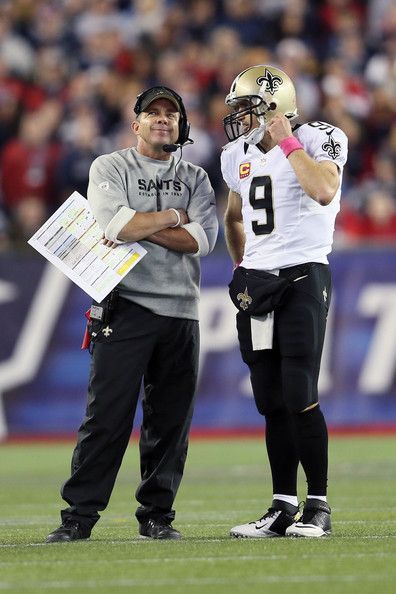
First, Kurt Warner and the Arizona Cardinals. Puh-leeze. The game that later had a direct correlation to “Bountygate,” was never in question, either before or after Bobby McCray’s open-field block on Warner on a Saints interception sent the grocery store stock boy turned NFL MVP into retirement.
Then came Brett Favre, of course, and the Minnesota Vikings. Saints defensive coordinator Gregg Williams smelled blood in that one, and the Saints bloodied Favre plenty, capitalizing on the Vikings’ turnovers to win 31-28 in overtime.
That was the night the Super Bowl became a reality, in New Orleans, and it never would have happened without Sean Payton.
Payton ran into plenty of obstacles in his 16-year run with the Saints, none more consequential than the NFL’s season-long suspension for Payton’s, uh, role in “Bountygate” in 2012. The Saints bottomed out that year, of course, but Payton brought them back to the playoffs, in 2013, before the team won four consecutive NFC South titles (2016-19), only to falter in the postseason.
(Including the horrendous no-call in the final moments of regulation in the 2017 NFC championship game against the Los Angeles Rams. I don’t know if the Saints would have beaten Tom Brady and the New England Patriots, in the Super Bowl, that season, but I know they wouldn’t have laid down and gotten their teeth kicked in like the Rams.)
I watched Payton’s interview with the “Dan Patrick Show” from the other day on Youtube, and the angular, incisive Patrick was able to get Sean to open up about what led to his decision, and where he goes from here.
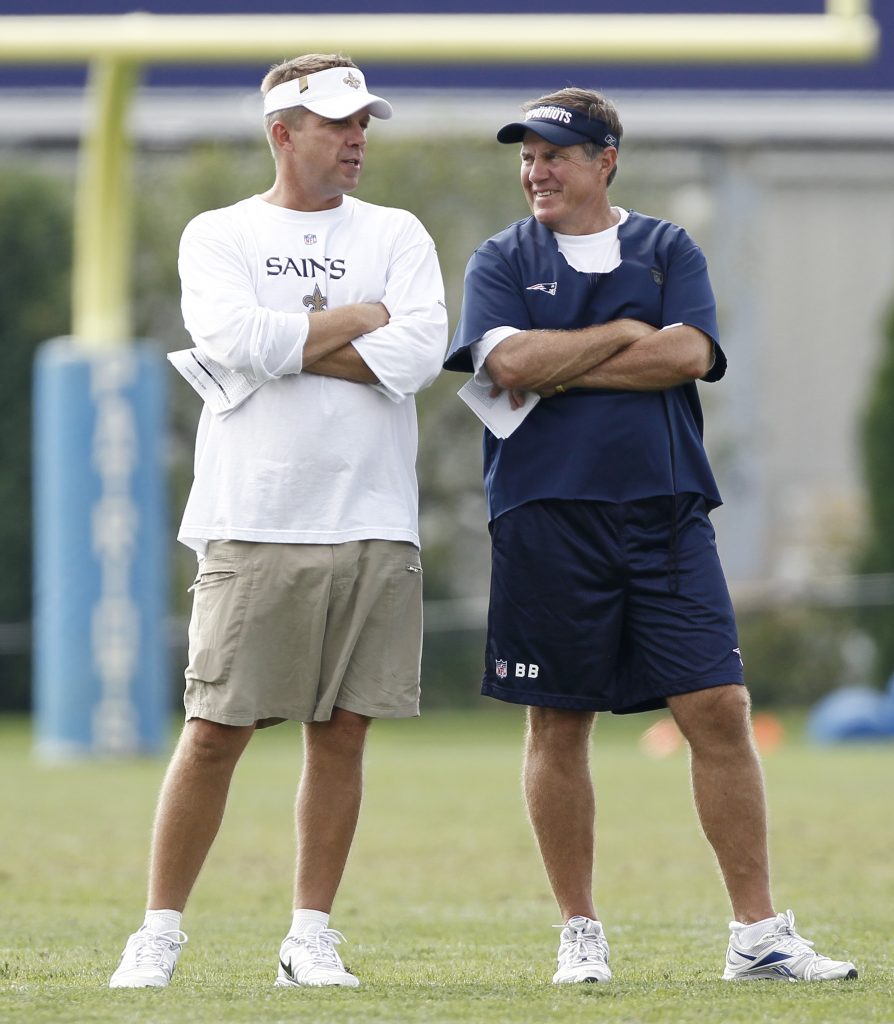
Payton relocated his family to the Dallas-Fort Worth Metroplex after the 2010 NFL season, a few months before he and his first wife, Beth, filed for divorce. There’s always been a lot of speculation about Payton someday coaching the Dallas Cowboys, but somehow, I just can’t see Sean Payton coexisting with the likes of Arkansas Jethro, aka Cowboys owner Jerry Jones.
That said, I never thought Bill Parcells could last four years with Jerry Jones, either, and it happened.
Payton seems to want to take some time away from coaching, which is understandable, given the demands of the profession, and take his shot at broadcasting.
He’d crush it, frankly.
Payton will take some criticism, of course, for walking while the Saints are in salary cap hell. But that’s long been their reality, and as long as Drew Brees was around, they’d be hamstrung in that respect.
But over the last six months, we saw what happens to a team WITHOUT a franchise quarterback, and that’s what Drew Brees and Sean Payton gave the Saints, a sense of stability.
Including the playoffs, Payton compiled a 162-97 record (a brilliant .624 winning percentage) in his 15 seasons as the Saints’ head coach, and when you measure that against most of his predecessors, well, don’t even bother.
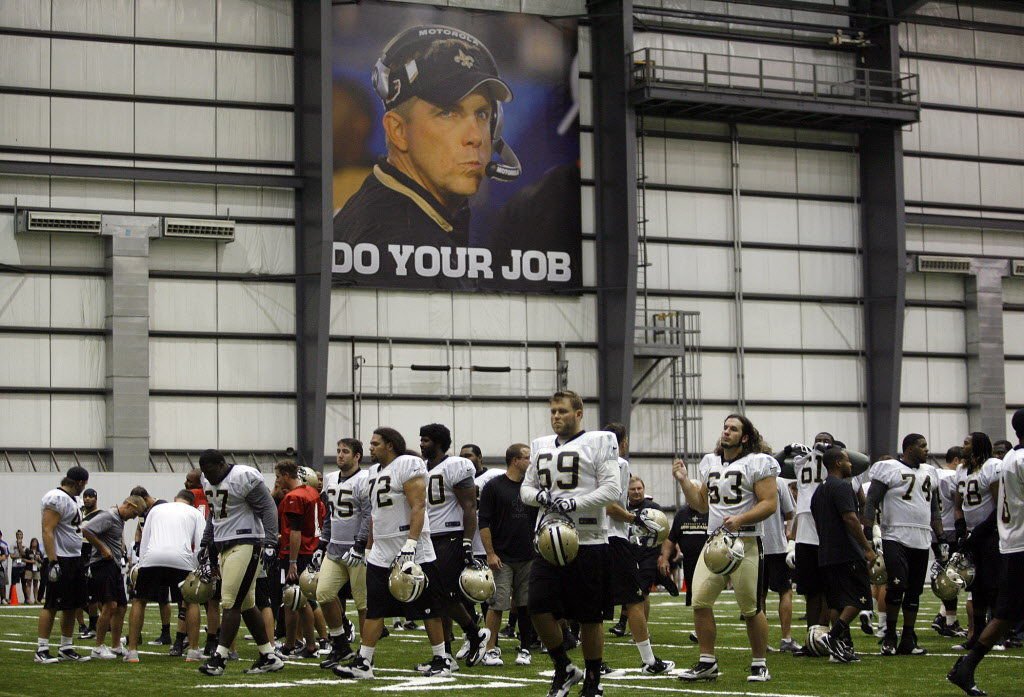
Even during his suspension in 2012, Sean Payton cast a watchful eye on the Saints at the team’s practice facility in Metairie, La. Payton, 58, stepped down as the team’s longtime coach on Tuesday.
“When I started understood the dynamics and what took place post-Katrina,” Payton said, “with that ’06 season that I thought and I would argue is every bit as important as any other season that we’ve had here relative to where the city was.
“And it became much more, much bigger than football.”
That’s because football is a way of life, in that part of the country. Always has been. Always will be.
(Jim Mora was successful with his defensive-minded Saints, in regular-season play, from 1986 until midway through the 1996 season, but the Saints totally bombed in four playoff appearances.)
Sean Payton’s impact, on the Saints, on New Orleans sports, on the self-esteem front with the entire Gulf South, will be hard to measure right now.
Suffice it to say he’s created a culture no one of us could have imagined, say, until the 2006 season, when the Saints won the second playoff game in club history, in Payton’s first year on the job.
“It’s not until you get older,” Payton said, ” … it became much more, much bigger than football.”
That’s what Sean Payton understood.
With the Saints, it always was much, much bigger than football. Especially after Katrina, and Payton’s tenure coincides with the storm’s aftermath.
He wasn’t around for Buddy Diliberto and his paper bags, Mike Ditka and his bully tactics, Jim Mora’s decision to fire longtime defensive coordinator Steve Sidwell, a bright guy and a loyal liuetenant, when the media and fan base were screaming about clueless offensive coordinator Carl Smith.
Payton’s innovative offense, his collaboration with Drew Brees, his Super Bowl victory over the Colts, and in particular, the decision to go for an onside kick to open the second half, will largely define his legacy.
I’m guessing his defensive coordinator, Dennis Allen, is his likely successor in New Orleans. Allen has been a head coach, in the NFL, and his two-plus years with the Oakland Raiders came in the immediate aftermath of Raiders czar Al Davis’ death. The Raidahs went 4-12 in each of Allen’s two full seasons with the team.
Allen called the shots, on the sideline, when Payton was out under the COVID-19 protocol and the Saints were beating Tom Brady and the Tampa Bay Buccaneers 9-0 in the final few weeks of the 2021 regular season. He could probably keep most of the Saints’ coaching staff intact, and the players clearly respect him.
But as last week’s four thrillers of the NFL playoffs told us, you better be able to score, and score a lot of points, to succeed these days in professional football.
Bottom line, there were a lot of unknowns, inside and outside the building, when the Saints cast their lot with Sean Payton on January 18, 2006.
He got out, seemingly on his own terms, and he created a winning culture, in a football-mad city.
Not by himself, and he’d be the first guy to tell you that.
Payton will be a tough act to follow, but the longtime Saints coach gave his successor a better-than-average chance.
